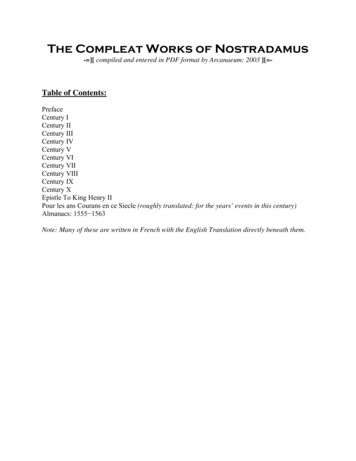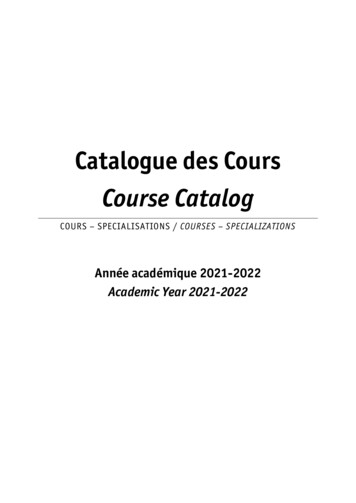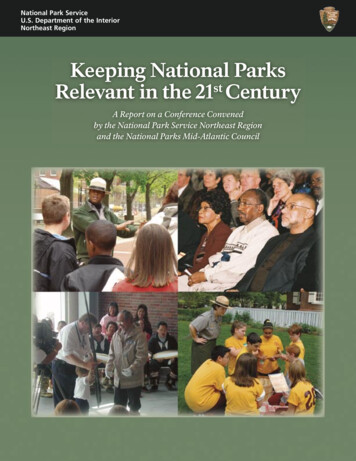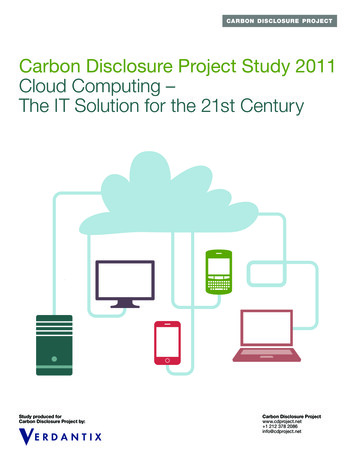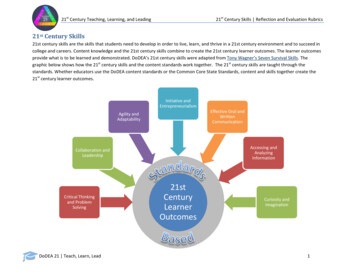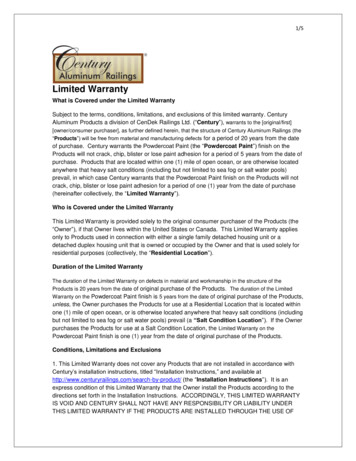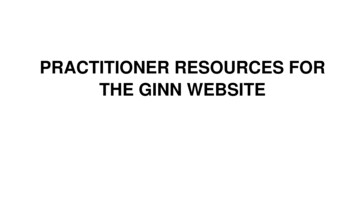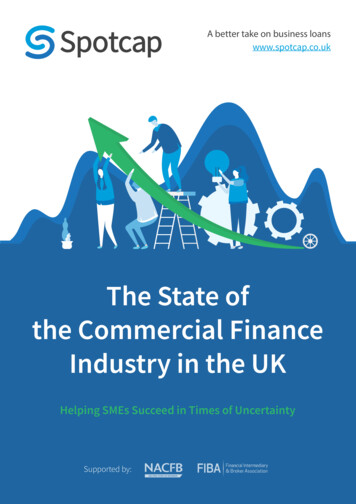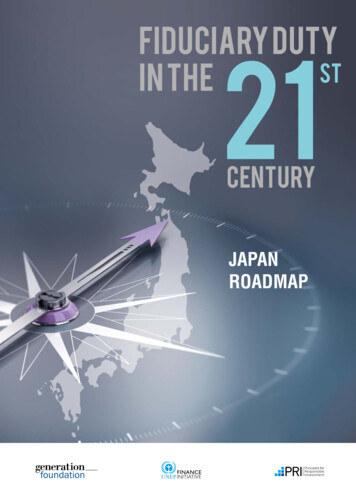
Transcription
FIDUCIARY DUTYSTIN THE21CENTURYJAPANROADMAP
2FIDUCIARY DUTY IN THE 21ST CENTURY - JAPAN ROADMAPTHE PROJECTFiduciary duty in the 21st century concluded that failing to considerlong-term investment value drivers, which include environmental,social and governance (ESG) issues, in investment practice isa failure of fiduciary duty1. Despite significant progress, manyinvestors have yet to fully integrate ESG issues into their investmentdecision-making processes.This document was developed through extensive industryconsultation and sets out recommendations to ensure that themodern interpretation of fiduciary duty is reflected in investmentpractice in Japan. It also sets the Japanese capital market in abroader international context as regulators and investors respond toa rapidly-changing investing environment.RECOMMENDATIONS:1.2.3.Stewardship and engagement:The FSA should provide enhanced oversight of the StewardshipCode. Japanese regulation should provide for mandatorydisclosure of proxy voting records. Corporate plans should beencouraged to sign the Stewardship Code.Corporate governance:The FSA should review the Corporate Governance Code ona triennial basis. It should seek improved disclosure of keyESG issues under the code (such as cross-shareholdings)and continue pressure to enhance corporate governanceexpectations.ESG disclosure and guidance for pension schemes:The Ministry of Health, Labour and Welfare (MHLW) shouldrequire pension schemes to disclose how they consider ESGissues in their investment processes and whether they aresignatories to the Stewardship Code.4.Corporate disclosure:a. The Ministry of Economy, Trade and Industry (METI) andthe FSA should review the quality and comparability of thecorporate disclosure of material ESG information.b. JPX should issue ESG guidance for listed companies.5.Asset owner leadership:GPIF, given its scale, size, and influence, should lead inestablishing market norms on stewardship, engagement andcorporate governance.It is an opportune time to engage with Japanese stakeholders onESG integration and fiduciary duty. The Government of Japan’spolicy priorities – under the label ‘Abenomics’ – include improvinginvestor stewardship and corporate governance. GPIF has signedup to the Principles for Responsible Investment and Japan’ssustainable investment sector is currently growing faster than anyother country or region2.ESG integration is defined as: “the systematic and explicitinclusion of material ESG factors into investment analysis andinvestment decisions”. It is an approach to investment analysisapplicable across asset classes, including equities, fixed incomeand private equity.PROJECT STEERING COMMITTEE Peter Knight, Partner, Generation Investment Management Fiona Reynolds, Managing Director, PRI Nick Robins, Co-Director, UNEP Inquiry into a SustainableFinancial System Eric Usher, Head, UNEP Finance Initiative1The term ‘fiduciary duty’ is commonly translated by law scholars in Japan as ‘Jyutakusha-Sekinin’ and is a widely-recognised concept among regulators, investors and companies. Japanese lawrefers to duties of care and loyalty; this broadly corresponds to fiduciary duty.2Global Sustainable Investment Review, 2016: GSIA Review2016.pdf
3FIDUCIARY DUTY IN THE 21ST CENTURY - JAPAN ROADMAPACKNOWLEDGEMENTSThe project team would like to thank all of the interviewees andreviewers for their time and contribution to this document, as wellas the many organisations in Japan whose work and ideas havehelped us get to this point. We would particularly like to thank MSCIfor hosting our stakeholder roundtable in Tokyo on 2 March 2017.This roadmap is prepared by the PRI, UNEP FI and The GenerationFoundation and does not necessarily represent the views ofinterviewees and reviewers.NameTitleOrganisationNicholas BenesRepresentative DirectorBoard Director Training Institute of JapanAmane FujimotoDeputy Director, Corporate Accounting andDisclosure DivisionFinancial Services AgencyArisa KishigamiHead of ESG, Asia PacificFTSE RussellToshiaki OguchiRepresentative DirectorGovernance for Owners JapanSachi SuzukiManager - EngagementHermes EOSChad A. CecereVice President, Client RelationsJapan Exchange Group (JPX)Hitoshi IzumiHead, Global StrategyJapan Exchange Group (JPX)Takeshi OkazakiGeneral Manager, Planning DivisionJapan Investment Advisers Association (JIAA)Tomohiro YamadaManagerJapan Investment Advisers Association (JIAA)Takeru ShimizuSpecial Officer for ResearchJapan Investment Advisers Association (JIAA)Masaru AraiChairJapan Sustainable Investment Forum (JSIF)Chihiro KawashimaExecutive Director, Economic and Social PolicyDepartmentJapanese Trade Union Confederation (JTUC-Rengo)Yuichi HarutaDirector, Economic Policy Division, Economic andSocial Policy DepartmentJapanese Trade Union Confederation (JTUC-Rengo)Kentaro ShigetomiSection Chief, Welfare Policy DivisionJapanese Trade Union Confederation (JTUC-Rengo)Yasuyuki KatoProfessor, Graduate School of ManagementKyoto UniversityYuka AkiwaConsultant, InvestmentsMercerMasaya OkuyamaDirector, Environment and Economy Division,Environmental Policy BureauMinistry of the EnvironmentShin IzumiDeputy Director, Environment and EconomyDivision, Environmental Policy BureauMinistry of the EnvironmentMinako TakabaVice President, ESG ResearchMSCISeiichiro UchiManaging Director, Japan Index CoverageMSCIGeorge IguchiHead of Corporate GovernanceNissay Asset Management CorporationToshikazu HayashiSenior AnalystNissay Asset Management Corporation
4FIDUCIARY DUTY IN THE 21ST CENTURY - JAPAN ROADMAPNameTitleOrganisationSadayuki HorieSenior Researcher, Financial Technology andMarket Research DepartmentNomura Research InstituteDaisuke HamaguchiChief Investment OfficerPension Fund Association (PFA)Ken HokugoDirector, Head of Corporate GovernancePension Fund Association (PFA)Teruo KatsuraAdvisor, Compliance OfficerPension Fund Association (PFA)Minoru MatsubaraChief ManagerResona BankHiroichi YagiManaging DirectorSecom Pension FundMasafumi HikimaProfessorSophia UniversityKazutaka KurodaSustainable Finance SpecialistThe Japan Research Institute, Limited (JRI)Eiichiro AdachiCounselor and Head of ESG Research CenterThe Japan Research Institute, Limited (JRI)Keiichi FukuyamaExecutive Managing DirectorThe Research Institute for Policies on Pension andAging (RIPPA)Ryujiro MikiSpecially Appointed ResearcherThe Research Institute for Policies on Pension andAging (RIPPA)Charles J. YangManaging DirectorTokio Marine Asset ManagementYasuhiro YonezawaProfessorWaseda Business School
5FIDUCIARY DUTY IN THE 21ST CENTURY - JAPAN ROADMAPESG ISSUES ANDFIDUCIARY DUTYIN JAPANESG policy developmentsand Japan’s economic prioritiesThe policies introduced through Japan’s Revitalization Strategy –often known as “Abenomics” – have created changes in corporateand investment practices across Japan’s capital market.Government ministries and agencies have been constructivelyengaging on ESG issues across several themes. The Ito Review commissioned by METI identified the importanceof sustainable value creation and a well-functioning investmentchain in the context of Japan’s broader economic challenges3.It concludes that corporate value comes from the “collaborativecreation” of companies and investors4. In that context,stewardship and asset owner interaction with their serviceproviders continues to be a core priority for The Government ofJapan. METI has also established a study group on sustainablevalue creation5 which will review the measures that bothcorporations and investors can take to generate and evaluatecorporate performance on sustainability. Japan’s Financial Services Agency (FSA) has developed theStewardship Code (recently revised and updated) and CorporateGovernance Code and has established the Council of Experts tooversee, monitor, update and provide guidance for both6. Thisreflects the FSA’s overriding mandate which expressly seeks topromote the “sustainable growth of business activities and thewider economy” in Japan and to cope with “uncertainties in theglobal economy” including arising from technological change7. The Ministry of the Environment has conducted long-termawareness raising on the environmental impacts of businessactivity. It co-ordinated the drafting of the Principles forFinancial Action towards a Sustainable Society (Principles forFinancial Action in the 21st Century; PFA21)8, produced a webportal for “Eco-Minded Business” directed at different elementsof the investment chain;9 and has built a one-stop-shopreporting platform for corporate environmental disclosures,supplementing its environmental reporting guidelines toJapanese corporates10. The reporting guidelines were scheduledto be updated to be consistent with the findings of the FinancialStability Board’s (FSB) Task Force on Climate-related FinancialDisclosures (TCFD)11. The Cabinet Office has focused on improving the workingenvironment within Japanese corporations, with a particularemphasis on the female labour force participation rate throughthe 2020/30 initiative12. As of 2016, corporations with morethan 300 employees are required to have a strategy to advancewomen’s role in the workplace (though without enforcement)13.This points to a steady evolution of the Government of Japan’sregulatory approach from a strict rules-based regime to principlesbased regulation. This can be seen in the FSA’s codes and recentfiduciary duty initiatives described below. This allows for a focus onindustry best practice rather than just compliance around minimumstandards and facilitates thematic reviews by regulatory agenciesinto priority issues, such as sustainability.3The Ito Review, Executive Summary: http://www.meti.go.jp/english/press/2014/pdf/0806 04c.pdf4METI journal, Ito Review: rnal2015 01b.pdf5METI Study Group: http://www.meti.go.jp/english/press/2016/0822 03.html6FSA Council of Experts: ndex.html7Strategic Directions and Priorities, JFSA: f8PFA21: /financial action.pdf9The web portal: https://www.env.go.jp/policy/keiei portal/index-en.html10Environmental Reporting Guidelines: 11An approach which incorporates other voluntary reporting frameworks such as CDP, GRI, SASB12Womenomics, FT: -cbdb03d7148013Japan: Women in the Workforce, FT: -398b2169cf79
6FIDUCIARY DUTY IN THE 21ST CENTURY - JAPAN ROADMAPAll these measures generate signficiant momentum forcorporations and investors to engage with ESG themes andhighlight the importance of sustainability issues to the widerJapanese population.Overcoming ESG misconceptionsand knowledge gapsWhile Japan lags equivalent developed markets in the extentand volume of ESG integration in investment processes14, thereis increasing market focus on ESG themes, particularly corporategovernance15. There is also growing investor awareness of thevalue-relevance of ESG issues, as well as some of the relevantinternational research on the matter16. However, there remains anurgent need for research on the financial materiality of ESG issuesin Japan.Our stakeholders recognised that misconceptions remain in marketawareness of ESG issues and the implications of ESG issues forinvestment practice. In that context, it was important to confirm thatESG integration referred to “the systematic and explicit inclusionof material ESG factors into investment analysis and investmentdecisions.” It is not a separate product or separate investmentapproach, but part of the broader process and technology ofinvestment analysis.Also, ESG issues are not uniform or hard to identify. The valuerelevance and materiality of an ESG factor will not be symmetricalacross sectors17. In fact, materiality varies systematically acrosssectors18. What is material for understanding the operationalperformance and financial prospects of a bank (risk management,cyber security), won’t be the same for an extractives firm (wateruse, GHG emissions).ESG factors may be some of the most consequential that aninvestor has to consider in relation to investee companies.Neglecting ESG factors may cause the mispricing of risk and poorasset allocation decisions—making it a fundamental componentof financial analysis. Corporate “ESG failures” have proved capableof destroying significant accounting and stock value, acrossjurisdictions19 and sectors20.Importantly, the materiality of ESG issues also varies acrosseconomies. We see this in The Government of Japan’s focus onissues related to the workplace and corporate governance. Thisreflects the fact that Japan has a rapidly-aging and decliningpopulation. Japan urgently needs more women to enter and remainin the workforce and for people to remain in work longer prior toretiring – which will require better management of human capitalin Japanese workplaces. These measures are vital to the financialsustainability of Japan’s retirement plans in addition to the financialhealth of its public institutions.ESG integration also does not involve a narrowing of the availableinvestment universe (unlike negative screening). Neither does itinvolve subordinating the pursuit of a financial return to unrelatedobjectives (social or ethical).14Scale of ESG investment in Japan, Nikko Research Centre: I 2017 trends: -4589-9cc0-00734bca6a6b16Corporate Sustainability: First Evidence on Materiality: -first-evidence-on-materiality17Corporate Sustainability: First Evidence on Materiality: -first-evidence-on-materiality18Why and how investors use ESG information, Serafeim, HBS: http://www.hbs.edu/faculty/Pages/item.aspx?num 5239219VW settlement, Fortune: -scandal/20Financial Impact of Dam Collapse, WSJ: -break-1-billion-analyst-says-1447043902
7FIDUCIARY DUTY IN THE 21ST CENTURY - JAPAN ROADMAPAdditionally, corporate governance is a major focus for institutionalinvestors (domestic and foreign) who consider its impact oninvestment returns and corporate purpose. This includes concernsregarding conflicts of interest related to the corporate governancepractices of Japan’s insurance companies and asset managers, inaddition to long-standing concerns regarding cross-shareholdings.These are critical issues for Japan and are also critical issuesfor the productivity, profitability and sustainability of Japanesecorporations.Developments in fiduciary dutyInternationally, regulators and government agencies have confirmedinterpretations relevant to fiduciary investment practice. In the US, the Department of Labor asserted that theconsideration of material ESG factors was an appropriatecomponent of the primary analysis of a prudent investmentdecision21. In Canada, the Financial Services Commission of Ontarionoted that the decision to incorporate ESG factors ininvestment processes of pension funds is in line with pensionadministrators’ fiduciary duty to monitor and mitigate risk22.The FSA has identified work on fiduciary duty as a strategicpriority24. Fiduciary duties tend to include the duties of prudenceand loyalty. This requires institutional investors to avoid conflictsof interest and provide services and advice in the best interests oftheir beneficiaries. The FSA is currently focusing on the advice andservices provided by intermediaries not formally subject to fiduciaryduties. This work reflects some of the themes of the Fiduciary Ruleissued by the Department of Labor in the US25.The FSA released its Principles for Customer-Oriented BusinessConduct26 in January 2017,27 an initiative we welcome. Havinginvestment firms issue statements concerning their fiduciaryresponsibilities to investors can assist in the development of probeneficiary market norms.However, there is a role for regulatory clarification that theconsideration of material ESG factors is a core part of a prudentinvestment process, equivalent to that provided by regulators inthe UK, US and Canada. Given this, we would expect the FSA toissue equivalent principles to enable investment managers andother regulated entities to confidently understand the scope of theirfiduciary responsibilities in relation to the consideration of materialESG factors in investment processes and decision-making. In the UK, the Law Commission, in its report FiduciaryDuties of Investment Intermediaries, stated that “there is noimpediment to trustees taking account of environmental, socialor governance factors where they are, or may be, financiallymaterial”23. This clarifies that it is not the origin of the factor (orthe label given to it), but rather its financial materiality that isrelevant to whether it should be considered.21Interpretive Bulletin Relating to the Fiduciary Standard under ERISA in Considering Economically Targeted Investments – also known as the ETI Bulletin22Financial Services Commission of Ontario, Investment Guidance Notes: IGN-004: Environmental Social and Governance (ESG) Factors, tive/Documents/IGN-004.pdf23Fiduciary Duties of Investment Intermediaries, UK Law Commission 2014: ry-duties-of-investment-intermediaries24FSA Agenda for financial markets: f25The US Fiduciary Rule is under review by the current administration26FSA release, Principles for Customer-Oriented Business Conduct: html27Draft principles for fiduciary duty: .html
8FIDUCIARY DUTY IN THE 21ST CENTURY - JAPAN ROADMAPRECOMMENDATIONS1. Stewardship and engagement: The FSA should provide enhanced oversight of the Stewardship Code.Japanese regulation should provide for mandatory disclosure of proxy voting records. Corporate plansshould be encouraged to sign the Stewardship Code.Expectations around how and how often institutional investorsengage with their investee companies have significantly increasedover the past decade. This has been led by two developments: soft-law encouragement from financial regulators; and institutional investors increasingly understanding and creatingcapacity to act upon the stewardship responsibilities withintheir fiduciary duties.The Stewardship Code: The Principles for Responsible InstitutionalInvestors, developed by the FSA in 2014 – known as theStewardship Code – has helped legitimise shareholder engagementpractices in a market where corporates and investors have beenreticent about active ownership (particularly if publicly disclosed).The volume and quality of institutional investor stewardship hassignificantly improved following the FSA’s launch of the code. Thecode has been signed by investment managers and public funds(though only by a very limited number of corporate pension plans).It has implications for market participants beyond its signatoriesby framing the normative expectations for stewardship practices.There is no legal enforcement mechanism for the complianceor quality of reporting against the code – signature of which isvoluntary. However, as the FSA administers the code, it is viewed asan important instrument by market participants.The Council of Experts, convened by the FSA to oversee the codeand suggest improvements, says that institutional investors areexpected to conduct “effective stewardship taking a mid tolong term perspective” structured around a deep evaluation of aninvestee company’s business model and commercial objectives28.In its revised code (subject to public comment)29, the Council ofExperts, following extensive deliberation30, significantly expandsits guidance under the code to emphasise the importance of ESGfactors and the interests of the ultimate beneficiary in conductingstewardship activities. The revised guidance also encouragessignatories to explain the implementation of the code’s principles– in addition to explanations provided where the signatory choosesnot to comply with a principle or related guidance. This reinforcesthe FSA’s intent that the code be an instrument that has practicalimplications for institutional investors. The revised code alsoprovides expanded guidance on: investment mandates, conflictsof interest, proxy voting disclosure, manager self-evaluations andcollective engagement (see below).The code closely tracks the stewardship code issued by theFinancial Reporting Council (FRC) in the United Kingdom31. Itdeviates from that code in only one material respect; the Japanesecode fails to indicate, in its principles, that investors should workwith other investors where they consider appropriate. Collaborativeengagements32 are a key strategic tool for institutional investors,particularly for engaging on ESG issues.28FSA Council of Experts on Stewardship Code, opinion statement no 3: tatements 3.pdf29Revised Stewardship Code, for public consultation: http://www.fsa.go.jp/en/news/pub/03.pdf30FSA Council of Experts discussion materials: /material/20170217 1.pdf31UK Stewardship Code: borative Engagement and Collective Engagement are used synonymously
9FIDUCIARY DUTY IN THE 21ST CENTURY - JAPAN ROADMAPSuch engagement can reduce the cost of engagement forboth investors and corporations and focus it on value-relevantfactors. Given this, we strongly welcome the guidance issued bythe Council of Experts in the revised code which identifies thatcollective engagement by institutional investors can be beneficial inconducting stewardship activities33.In Japan, collaborative engagements have been discouraged byasset manager concerns around the ease with which investorsmay be considered to be either “acting in concert” or “makingimportant suggestions” under existing securities regulation.Collective engagement is a relatively new concept to Japaneseinstitutional investors and asset managers have been consideringhow such engagements can be structured. It is also a sensitiveand important issue for Japanese institutional investors andregulators. Our commentary seeks to identify the balance offeedback received from the stakeholders we engaged with ratherthan to form a definitive view. The FSA provided guidance on thissubject in 201434. Some stakeholders considered that the FSA’sguidance provided a useful benchmark for structuring collaborativeengagements in Japan. However, many of our stakeholdersthought that the issued guidance provided insufficient clarity onthe scope of collaborative engagement activities that could beconducted without tripping over reporting requirements. Regulatoryclarification had also been provided in the UK, which had explicitlysought to provide greater comfort to investors wanting to workcollaboratively (as reflected in the UK stewardship code)35. Giventhe revised code’s reference to the potential benefit of collectiveengagement, we expect Japanese asset managers to considercollaborative engagement strategies as part of their potential mixof stewardship approaches. As a degree of uncertainty remains,the FSA should issue revised and updated guidance in relation to“acting in concert” or “making important suggestions” regardingcollective engagement.Stewardship codes are relatively new market instruments. However,it is clear that broad adoption and effective reporting againstthe code are key to a code having impact. For a code to be trulyeffective, the quality of reporting against it ought to become atool for competitive differentiation between asset managers (anda relevant source of information for asset owners in managerselection procedures). In this context, we highlight the FRC’s recent“tiering” exercise of signatory reporting quality against the UKcode36. This categorised code reporting into three categories, thelowest of which indicated poor performance against the code37.At the core of stewardship is the responsibility of asset owners andinvestment managers to be mindful and effective stewards of theassets they hold for their beneficiaries. There was an expectationthat major asset owners, such as GPIF, can provide a usefuloversight and monitoring function of other code signatories throughits broad arrangements with Japan’s asset managers. As such, therole of the regulator can only be an overlay to institutional investorstewardship. Nonetheless, we expect the FSA to continue to closelymonitor the code to ensure that it is an effective instrument indriving the adoption of stewardship practices.Market practice: Engagement with investee companies hastended to be conducted mainly by overseas investors, who playa major role in the market for Japanese equities (around 30%of tier one JPX equities are internationally owned). Internationalinvestors, supported by domestic managers, have led high-profileengagements, such as the initiative around independent boardrepresentation in 201438.33See guidance issued under Principle 4 in the revised Code34FSA guidance on stewardship code: /20140226.pdf35FRC guidance to UK investors: lder engagement FSA letter.pdf36FRC tiering: tewardship-Code.aspx37FRC ranks fund managers: tewardship-code/78038Investor letter on board composition: http://www.standardlifeinvestments.com/CG Letter Regarding Board Independence/getLatest.pdf
10FIDUCIARY DUTY IN THE 21ST CENTURY - JAPAN ROADMAPHowever, Japanese asset managers are building their stewardshipcapacity and considering how best to structure engagements withinvestee companies. Groupings of Japanese investors, such asthe Pension Fund Association, have hired international investmentmanagers (like Hermes EOS) to conduct corporate engagement.Specialist Japanese engagement platforms (like Governance forOwners Japan) can also demonstrate positive track records fromdeep-dive engagement efforts with Japanese corporations across arange of value-relevant issues, including ESG factors.Central to engagement with Japanese corporations was anunderstanding of the culture and history of each corporation andtaking the time to build the trust upon which effective engagementdepended – an expectation highlighted in Principle 7 of theStewardship Code39. Engagement also had to be perceived asuseful to investee companies. This meant structuring engagementby reference to key corporate objectives based on an understandingof its business model. Pro-forma engagements were less likelyto receive attention, except where these were focused on corecorporate governance themes.Japanese corporations have become less reluctant to engagewith investors and have begun to build investor relations teams.It is understood that corporations often welcome the insights ofinvestors, expanding the evidence to which corporations haveaccess in strategy development. This was supported by emergingevidence that engagement by investors could produce value upsideover the long term40, confirming studies from other markets such asthe US41.Recommendations: Oversight of the code: The FSA should continue to monitorthe reporting against the code and consider adopting a “tieringexercise” of code signatories (as conducted by the FRC in theUK) to enable it to be a tool of competitive differentiation amongasset managers. Proxy voting disclosure: The FSA should ensure thatJapanese institutional investors (including insurance companiesand corporations that own Japanese equities) provide specific,by corporation and by proposition, disclosure of proxy votingrecords (equivalent to disclosures mandated in the US). Thedisclosure guidance in the revised code is very welcome.However, statutory changes should be made to mandate suchdisclosures for institutional and corporate holders of Japaneseequities. Such disclosure is a vital market signal and should notbe a matter of voluntary disclosure. Acting in concert and the act of making importantsuggestions: Given the welcome guidance note in the revisedcode regarding the potential benefits of collective engagement,we expect Japanese asset managers to consider collaborativeengagement strategies where they have not already doneso. Given stakeholder uncertainty, the FSA should continue toconsult with institutional investors and update its guidanceregarding available collective engagement strategies. Corporate pension plans: Corporate pension plans shouldbe further encouraged to become signatories to the code.We support the initiative of the Pension Fund Association onthis issue. Following this, corporate pension plans shouldbe required to set out stewardship policies in their “BasicInvestment Policy”, and disclose to beneficiaries whether or notthey have signed the code, and if not, explain why (discussed inRecommendation 3).39Keys to success of Japan’s stewardship code, NRI (page 3): https://www.nri.com/ pdf40The Power of Engagement: wer-of-engagement/41Valuing the Vote, SBA: 6/SBAValuingtheVo
FIDUCIARY DUTY IN THE 21ST CENTURY - JAPAN ROADMAP 2 Fiduciary duty in the 21st century concluded that failing to consider long-term investment value drivers, which include environmental, social and governance (ESG) issues, in investment practice is a failure of fiduciary duty1. Despite significant progress, many
